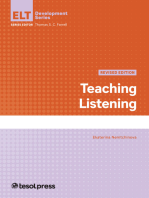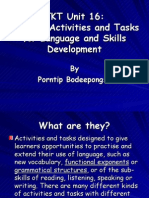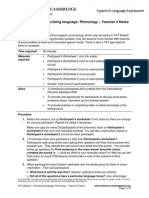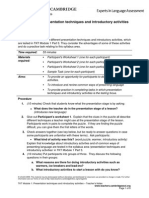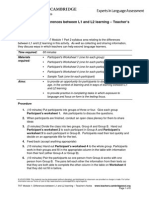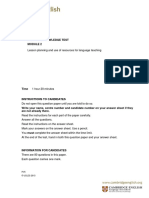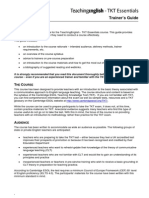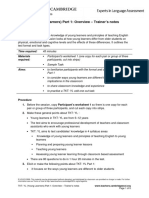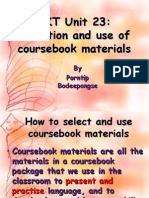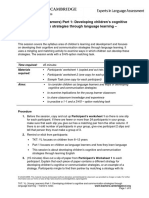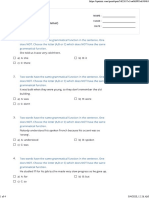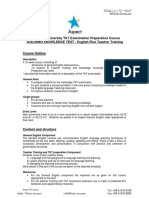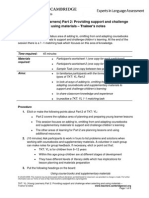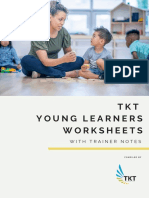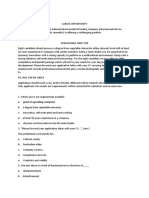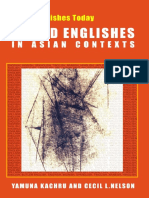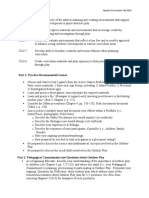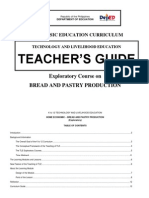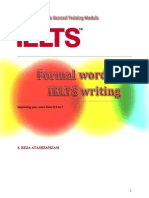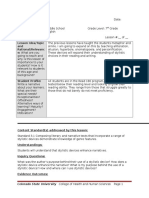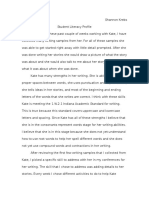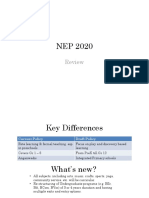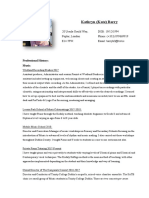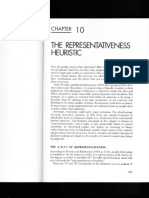TKT Module 1 Functions
TKT Module 1 Functions
Uploaded by
pepeivan2Copyright:
Available Formats
TKT Module 1 Functions
TKT Module 1 Functions
Uploaded by
pepeivan2Original Title
Copyright
Available Formats
Share this document
Did you find this document useful?
Is this content inappropriate?
Copyright:
Available Formats
TKT Module 1 Functions
TKT Module 1 Functions
Uploaded by
pepeivan2Copyright:
Available Formats
TKT Module 1: Describing language: Functions Teachers Notes
Description This activity introduces teachers to functions and their exponents, tested in TKT Module 1 Part 1 (concepts and terminology for describing language: functions). Participants consider the exponents of different functions, the importance of context and the effect of register. Time required: Materials required: 55 minutes Aims: Participants Worksheet 1 (one for each pair) Participants Worksheet 2 (cut into strips) Participants Worksheet 3 (one for each participant) Sample Task (one for each participant) To provide an opportunity for participants to discuss functions including context, levels of formality and appropriacy To familiarise participants with a range of functions and their typical exponents. To provide practice in completing tasks in which functions is the testing focus.
Procedure 1. Before the session, cut Participants worksheet 2 into strips, so there is one strip for each participant. Repeat some strips if necessary. 2. (10 minutes) On the board write: Expressing certainty, Expressing a dislike, Apologising, Speculating. Elicit that we call these aspects of language functions (ways of describing how particular chunks of language are used). 3. Put participants into pairs. Give each pair a copy of Participants worksheet 1. Tell participants that there are ten functions in the word search activity. Allow them three minutes to find as many as they can. If participants are finding it difficult, give them some of the words or give clues. 4. Check answers together (see key below). Explain that functions fall into the syllabus area of concepts and terminology for describing language, which is tested in TKT Module 1 Part 1. 5. (10 minutes) Go back to the functions written on the board in Step 2. Elicit one or two exponents of each function and write them on the board, e.g. Expressing certainty - Im sure Expressing a dislike I dont like... Apologising Im sorry Speculating it might be...
UCLES 2009. This material may be photocopied (without alteration) and distributed for classroom use provided no charge is made. For further information see our Terms of Use at http://www.teachers.cambridgeESOL.org/ts/legalinfo
TKT Module 1: Describing language: Functions Teachers Notes
www.teachers.cambridgeesol.org Page 1 of 9
Make sure participants are clear on the difference between a function and its exponents (the function is the purpose of what you are saying; the exponent is the words you use to say it). 6. Give each participant a strip with one function from Participants worksheet 2. Ask them to write an exponent for their function on the back of the strip. They should check their example with a partner so that they can help and correct each other. 7. Ask participants to walk around the room saying their example exponents to other participants. The other participants listen and say what the function is that is being expressed, e.g. One participant might say I dont like football, the other participants should say expressing dislike. 8. Feed back to deal with any questions arising from the exercise. 9. (10 minutes) On the board, write: Fred: Im sorry, Ill buy you a new one. Beth: Dont worry, it wasnt a special one. Fred: Sorry? Beth: I said it wasnt a special one. Underline the word sorry and elicit the two different functions being expressed by this word (Im sorry is apologising for doing something wrong, e.g. breaking something and Sorry? is asking for repetition). what made it possible to know what the function was (context/situation). 10. Ask participants to look at the functions and exponents on their strips Steps 6 and 7. In pairs, participants discuss the different possible contexts/situations of their functions and exponents. 11. (10 minutes) On the board, write: I must apologise for the delay. Im sorry I think we may be a bit late. Sorry but Im being as quick as I can, you know. Establish that each of these is expressing the function of apologising, but in different ways. Elicit how they are different (level of formality/register. The first is formal the second is neutral and the third is informal). 12. Put participants into groups of three. Hand out Participants worksheet 3. Participants decide what the functions of the exponents on the worksheet are and if they are formal, informal or neutral. 13. Check answers together (see key below). 14. (10 minutes) Give out Sample Task. Participants complete the sample task on their own then compare their answers with a partner. 15. Check answers together (see key below).
UCLES 2009. This material may be photocopied (without alteration) and distributed for classroom use provided no charge is made. For further information see our Terms of Use at http://www.teachers.cambridgeESOL.org/ts/legalinfo
TKT Module 1: Describing language: Functions Teachers Notes
www.teachers.cambridgeesol.org Page 2 of 9
16. (5 minutes) Round up to summarise points covered. Ask participants: What is the TKT Module 1 syllabus area for this lesson? (concepts and terminology for describing language functions) What is the testing focus for this syllabus area? (context, levels of formality, appropriacy, a range of functions and their typical exponents) What do you understand by appropriacy in relation to functions? (using a suitable exponent in a particular situation, e.g. formal exponents in formal situations, less formal exponents in less formal situations) How can participants prepare for this section of the test? (look at the functions section in the TKT Glossary and make sure that they are familiar with the terms and the uses of the functions listed. Also look in coursebooks for functional language.)
UCLES 2009. This material may be photocopied (without alteration) and distributed for classroom use provided no charge is made. For further information see our Terms of Use at http://www.teachers.cambridgeESOL.org/ts/legalinfo
TKT Module 1: Describing language: Functions Teachers Notes
www.teachers.cambridgeesol.org Page 3 of 9
TKT Module 1: Describing language: Functions Answer Keys
Key to Participants worksheet 1 The words are: praising, requesting, advising, agreeing, inviting, thanking, refusing, suggesting, apologising, greeting. Shown in bold in the grid below, with the initial letter of each word shaded grey. G P J A V M O L A S T B N R E F U S I N G A H N I A O I L U W B R K A Y T I D N A G R E E I N G S S M V X G T U E Q K S E I A I I E O F T H I C U N I T I S L P I A N I Q G A I O T I A N I G O E L G N M I W N G A J H R Q Y G B N O I G I S N A P O L O G I S I N G D
Key to Participants Worksheet 3 1. 2. 3. 4. 5. 6. 7. 8. 9. 10. 11. 12. 13. 14. thanking requesting inviting requesting refusing agreeing introducing yourself refusing inviting introducing yourself requesting inviting agreeing thanking neutral formal informal neutral informal neutral neutral formal neutral formal informal formal informal formal
UCLES 2009. This material may be photocopied (without alteration) and distributed for classroom use provided no charge is made. For further information see our Terms of Use at http://www.teachers.cambridgeESOL.org/ts/legalinfo
TKT Module 1: Describing language: Functions Answer Keys
www.teachers.cambridgeesol.org Page 4 of 9
Key to Sample Task 1 5 F C 2 6 B G 3 7 H D 4 A
UCLES 2009. This material may be photocopied (without alteration) and distributed for classroom use provided no charge is made. For further information see our Terms of Use at http://www.teachers.cambridgeESOL.org/ts/legalinfo
TKT Module 1: Describing language: Functions Answer Keys
www.teachers.cambridgeesol.org Page 5 of 9
TKT Module 1: Describing language: Functions Participants Worksheet 1 Find ten functions in the word search.
G P J A V M O L A S T B
N R E F U S I N G A H N
I A O I L U W B R K A Y
T I D N A G R E E I N G
S S M V X G T U E Q K S
E I A I I E O F T H I C
U N I T I S L P I A N I
Q G A I O T I A N I G O
E L G N M I W N G A J H
R Q Y G B N O I G I S N
A P O L O G I S I N G D
UCLES 2009. This material may be photocopied (without alteration) and distributed for classroom use provided no charge is made. For further information see our Terms of Use at http://www.teachers.cambridgeESOL.org/ts/legalinfo
TKT Module 1: Describing language: Functions Participants Worksheet 1 www.teachers.cambridgeesol.org Page 6 of 9
TKT Module 1: Describing language: Functions Participants Worksheet 2
Asking for an opinion Introducing yourself Introducing someone else Clarifying Praising Requesting Advising Agreeing Inviting Thanking Refusing Suggesting
Complaining
Greeting
UCLES 2009. This material may be photocopied (without alteration) and distributed for classroom use provided no charge is made. For further information see our Terms of Use at http://www.teachers.cambridgeESOL.org/ts/legalinfo
TKT Module 1: Describing language: Functions Participants Worksheet 2 www.teachers.cambridgeesol.org Page 7 of 9
TKT Module 1: Describing language: Functions Participants Worksheet 3
Look at the exponents. What are the functions of the exponents? Are they formal (F), informal (I), or neutral (N)?
1. Thanks a lot 2. Do you think you could possibly open the window? 3. Come round to my house for a bite to eat? 4. Can you open the window, please? 5. No way! Im not doing that. 6. I agree with that. 7. Hello, Im Josephine. 8. Im sorry but Im afraid I cant. 9. Would you like to come to dinner? 10. I dont believe weve met. My names James Sanders. 11. Open the window, will you? 12. Mr and Mrs Smith request the pleasure of your company for dinner. 13. Yeah. Youre right there. 14. Thank you very much indeed.
UCLES 2009. This material may be photocopied (without alteration) and distributed for classroom use provided no charge is made. For further information see our Terms of Use at http://www.teachers.cambridgeESOL.org/ts/legalinfo
TKT Module 1: Describing language: Functions Participants Worksheet 3 www.teachers.cambridgeesol.org Page 8 of 9
TKT Module 1: Describing language: Functions Sample Task
Exercise 3 For questions 17 match the example sentences with the functions listed AH. Mark the correct letter (AH) on your answer sheet. There is one extra option which you do not need to use. Example sentences 1 Lets go to that new restaurant. A Functions describing ability
They might win you never know in cup matches!
describing possibility
Watch out! Thats dangerous.
asking for permission
My son can speak three languages fluently.
requesting
Is it OK if I open the window?
asking for advice
Shall I show you how the camera works?
suggesting
Could you pass me my bag?
G offering
warning
UCLES 2009. This material may be photocopied (without alteration) and distributed for classroom use provided no charge is made. For further information see our Terms of Use at http://www.teachers.cambridgeESOL.org/ts/legalinfo
TKT Module 1: Describing language: Functions Sample Task
www.teachers.cambridgeesol.org Page 9 of 9
You might also like
- Curriculum Design in English Language TeachingFrom EverandCurriculum Design in English Language TeachingRating: 5 out of 5 stars5/5 (1)
- Cambridge TKT Module 2 WorksheetsDocument64 pagesCambridge TKT Module 2 WorksheetsheloNo ratings yet
- Experimental Practice in ELT: Walk on the wild sideFrom EverandExperimental Practice in ELT: Walk on the wild sideRating: 4.5 out of 5 stars4.5/5 (3)
- TKT Module 2 Using Teaching AidsDocument6 pagesTKT Module 2 Using Teaching AidsSonia Campbell HamiltonNo ratings yet
- TKT Unit 16 PracticeDocument8 pagesTKT Unit 16 PracticePorntip Bodeepongse รักในหลวง100% (4)
- Unit 27module3Document32 pagesUnit 27module3lilianabor100% (2)
- Designing Authenticity into Language Learning MaterialsFrom EverandDesigning Authenticity into Language Learning MaterialsFrieda MishanNo ratings yet
- TKT Module 1 Language and Skills DevelopmentDocument9 pagesTKT Module 1 Language and Skills DevelopmentMona Gomez F.No ratings yet
- TKT Module 2 Identifying and Selecting Lesson Aims PDFDocument7 pagesTKT Module 2 Identifying and Selecting Lesson Aims PDFRachel Maria Ribeiro100% (2)
- TKT Module 1 The Role of Error PDFDocument8 pagesTKT Module 1 The Role of Error PDFRachel Maria RibeiroNo ratings yet
- TKT Module 1 GrammarDocument13 pagesTKT Module 1 GrammarSonia Campbell HamiltonNo ratings yet
- TKT Module 1 Types of Activities and Tasks For Language and Skills Development PDFDocument9 pagesTKT Module 1 Types of Activities and Tasks For Language and Skills Development PDFRachel Maria Ribeiro100% (2)
- TKT Module 1 Describing Language Phonology PDFDocument9 pagesTKT Module 1 Describing Language Phonology PDFRachel Maria Ribeiro50% (2)
- Cambridge TKT Module 1 Worksheets PDFDocument141 pagesCambridge TKT Module 1 Worksheets PDFMaxmudova ManzuraNo ratings yet
- TKT Module 2 Selection and Use of Teaching Aids PDFDocument6 pagesTKT Module 2 Selection and Use of Teaching Aids PDFRachel Maria Ribeiro100% (1)
- TKT Module 3 The Roles of The TeacherDocument8 pagesTKT Module 3 The Roles of The TeacherALFREDO6411100% (1)
- TKT Module 2 Common Sequences in Lessons PDFDocument7 pagesTKT Module 2 Common Sequences in Lessons PDFRachel Maria RibeiroNo ratings yet
- TKT Module 1 Presentation Techniques and Introductory Activities PDFDocument8 pagesTKT Module 1 Presentation Techniques and Introductory Activities PDFRachel Maria RibeiroNo ratings yet
- TKT Module 3 Part 1 Functions of Teacher LanguageDocument6 pagesTKT Module 3 Part 1 Functions of Teacher LanguageALFREDO6411No ratings yet
- Module 2 Past Examination PaperDocument19 pagesModule 2 Past Examination PaperNino AvalianiNo ratings yet
- TKT Module 1 Assessment Types and TasksDocument8 pagesTKT Module 1 Assessment Types and TasksElham S. RefaatNo ratings yet
- TKT Module 1 Learner Needs PDFDocument7 pagesTKT Module 1 Learner Needs PDFRachel Maria Ribeiro0% (1)
- TKT Module 1 Differences Between l1 and l2 Learning PDFDocument8 pagesTKT Module 1 Differences Between l1 and l2 Learning PDFRachel Maria Ribeiro100% (1)
- TKT Module 1 Motivation PDFDocument6 pagesTKT Module 1 Motivation PDFRachel Maria Ribeiro100% (1)
- TKT Yl Part 1 OverviewDocument6 pagesTKT Yl Part 1 OverviewChris Storm100% (1)
- TKT Module 2 Sample Paper DocumentDocument20 pagesTKT Module 2 Sample Paper DocumentЕвгения СамойловаNo ratings yet
- TKT Yl Young Learners Part 3 Using Practice Activities PDFDocument9 pagesTKT Yl Young Learners Part 3 Using Practice Activities PDFRachel Maria Ribeiro100% (2)
- TKT Essentials Trainer GuideDocument5 pagesTKT Essentials Trainer GuideJuanfraMz100% (3)
- TKT Yl Sample TestDocument16 pagesTKT Yl Sample TestLiz CGNo ratings yet
- TKT Yl Young Learners Part 4 Purposes of Assessing Learning PDFDocument7 pagesTKT Yl Young Learners Part 4 Purposes of Assessing Learning PDFRachel Maria Ribeiro100% (1)
- TKT YL Trainer NotesDocument120 pagesTKT YL Trainer NotesMohsen50% (2)
- TKT Unit 23Document19 pagesTKT Unit 23Porntip Bodeepongse รักในหลวง100% (1)
- TKT Young Learners SyllabusDocument5 pagesTKT Young Learners SyllabusНиколета Иванова100% (1)
- TKT Young Learners Part 1developing - Children's - Cognitive - and - Communication - Strategies PDFDocument8 pagesTKT Young Learners Part 1developing - Children's - Cognitive - and - Communication - Strategies PDFRomina RubioNo ratings yet
- TKT Yl Young Learners Part 4 Acting On Assessment Evidence PDFDocument8 pagesTKT Yl Young Learners Part 4 Acting On Assessment Evidence PDFRachel Maria Ribeiro100% (2)
- TKT - YL - Face - To - Face - Materials - Part 4 PDFDocument20 pagesTKT - YL - Face - To - Face - Materials - Part 4 PDFTJNo ratings yet
- TKT Yl Young Learners Part 2 Lesson Plans PDFDocument12 pagesTKT Yl Young Learners Part 2 Lesson Plans PDFRachel Maria RibeiroNo ratings yet
- TKT Essentials Online Trainer GuideDocument14 pagesTKT Essentials Online Trainer GuideZardoz501100% (2)
- TKT Yl Young Learners Part 2 Using Additional Resources PDFDocument8 pagesTKT Yl Young Learners Part 2 Using Additional Resources PDFRachel Maria Ribeiro100% (3)
- TKT Module 2 Using Reference Resources For Lesson Planning PDFDocument6 pagesTKT Module 2 Using Reference Resources For Lesson Planning PDFRachel Maria RibeiroNo ratings yet
- TKT Module 1: Unit 11 The Role of ErrorDocument29 pagesTKT Module 1: Unit 11 The Role of ErrorBijou LefèvreNo ratings yet
- Working Towards Module 2Document16 pagesWorking Towards Module 2Andy Quick100% (3)
- TKT Module 1 (Unit 1 Grammar) - Print - QuizizzDocument4 pagesTKT Module 1 (Unit 1 Grammar) - Print - QuizizzAhmad100% (1)
- Certificacion TKT IH International Oct19Document63 pagesCertificacion TKT IH International Oct19Лора ПестряковаNo ratings yet
- TKT Kal Sample PaperDocument16 pagesTKT Kal Sample Papertariq_nuri83% (6)
- TKT PreparationDocument2 pagesTKT PreparationOaky TablesNo ratings yet
- TKT Unit 24Document26 pagesTKT Unit 24Porntip Bodeepongse รักในหลวง100% (2)
- TKT Yl Young Learners Part 1 Children As Language Learners and Developing Children S Learning Strategies PDFDocument8 pagesTKT Yl Young Learners Part 1 Children As Language Learners and Developing Children S Learning Strategies PDFRachel Maria Ribeiro100% (7)
- TKT Unit 11 - ErrorsDocument10 pagesTKT Unit 11 - ErrorsPorntip Bodeepongse รักในหลวง100% (1)
- TKT Yl Young Learners Part 4 Focuses of Assessing Learning PDFDocument8 pagesTKT Yl Young Learners Part 4 Focuses of Assessing Learning PDFRachel Maria Ribeiro100% (4)
- TKT Yl Sample Test PDFDocument16 pagesTKT Yl Sample Test PDFJonsen BostonNo ratings yet
- TKT Yl Young Learners Part 2 Providing Support and Challenge When Selecting and Using Materials PDFDocument8 pagesTKT Yl Young Learners Part 2 Providing Support and Challenge When Selecting and Using Materials PDFRachel Maria Ribeiro100% (2)
- TKT Unit 10 - Exposure and Focus On FormDocument10 pagesTKT Unit 10 - Exposure and Focus On FormPorntip Bodeepongse รักในหลวง100% (2)
- TKT Young Learners Worksheets: With Trainer NotesDocument92 pagesTKT Young Learners Worksheets: With Trainer NotesThu Naing100% (1)
- PGT History 23Document3 pagesPGT History 23CS60Lakshya PantNo ratings yet
- Theory of BrainDocument2 pagesTheory of BrainAnissh WaranNo ratings yet
- CSTP 4Document5 pagesCSTP 4Jordan OwenNo ratings yet
- Developmental SupervisionDocument72 pagesDevelopmental SupervisionSyarifudin AmmarNo ratings yet
- FormDocument51 pagesFormMd Ziaul HaqueNo ratings yet
- Che 1315 401 51733 20083Document6 pagesChe 1315 401 51733 20083ElliotPianoNo ratings yet
- Bec D.O 25 S.2002Document2 pagesBec D.O 25 S.2002Lorreanne May AlveroNo ratings yet
- Career OppurtunityDocument6 pagesCareer OppurtunityAgus RidhaniNo ratings yet
- Enaes Project Reading Rescue: Department of EducationDocument2 pagesEnaes Project Reading Rescue: Department of EducationMarites Del Valle VillaromanNo ratings yet
- (Yamuna Kachru, Cecil L. Nelson) World Englishes PDFDocument435 pages(Yamuna Kachru, Cecil L. Nelson) World Englishes PDFJunaid AhmadNo ratings yet
- Jl. Raya Babakan Madang, Babakan Madang, Bogor, Jawa Barat 16810Document7 pagesJl. Raya Babakan Madang, Babakan Madang, Bogor, Jawa Barat 16810api-298585097No ratings yet
- Outdoor Play AssignmentDocument2 pagesOutdoor Play AssignmentUdayangaNo ratings yet
- Our Favorite Mexican Food Lesson Plan Day 2Document4 pagesOur Favorite Mexican Food Lesson Plan Day 2api-245081461100% (1)
- K To 12 Bread and Pastry Teacher's GuideDocument19 pagesK To 12 Bread and Pastry Teacher's GuideHari Ng Sablay98% (53)
- Formal Words For IELTS WritingDocument12 pagesFormal Words For IELTS Writingdw1919100% (40)
- Short Comings in The Present Systems of Assessment and The Ways of Their EliminationDocument3 pagesShort Comings in The Present Systems of Assessment and The Ways of Their Eliminationsubhom nath100% (1)
- Cep Lesson Plan Literary DevicesDocument6 pagesCep Lesson Plan Literary Devicesapi-349582098No ratings yet
- Student Literacy ProfileDocument4 pagesStudent Literacy Profileapi-263185417No ratings yet
- Nombrado CVDocument1 pageNombrado CVMarlon NombradoNo ratings yet
- Nep 2020Document13 pagesNep 2020Vibhay VibhaNo ratings yet
- Contemporary Realistic FictionDocument6 pagesContemporary Realistic FictionSyahirah Alias100% (1)
- Big Book ReflectionDocument2 pagesBig Book Reflectionapi-472451946100% (1)
- 2006-7 Ug Handbook Years1234Document74 pages2006-7 Ug Handbook Years1234Joel Kevin SaldanhaNo ratings yet
- Kathryn (Kate) Barry: Professional History: MusicDocument2 pagesKathryn (Kate) Barry: Professional History: MusicKate BarryNo ratings yet
- VDW-K 3Document29 pagesVDW-K 3MuhammadAdnanNo ratings yet
- 2 - Heuristics ChaptersDocument30 pages2 - Heuristics Chapterstkkt1015No ratings yet
- Sannino DetailedCV Dec2010FDocument5 pagesSannino DetailedCV Dec2010FjulionNo ratings yet
- Common Teaching MethodsDocument4 pagesCommon Teaching MethodsChee Mei YinNo ratings yet
- English 9 Summer Assignments MR McgroartyDocument9 pagesEnglish 9 Summer Assignments MR Mcgroartyapi-327137533No ratings yet



